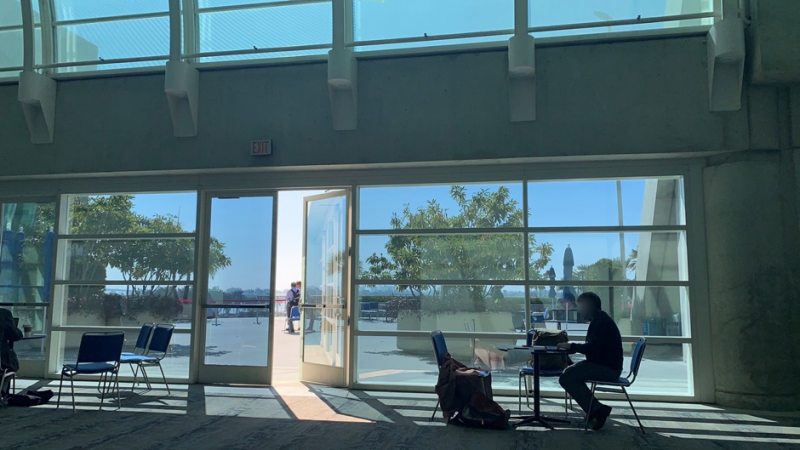Ocean Sciences 2020 - San Diego
Yixi Zheng
University of East Anglia

It was the first mega-meeting in my life. I tried my best to not get too overwhelmed by more than one hundred of sessions. The poster hall is giant and it took most people 5 mins to find their own poster boards. My poster focusing on recent work, the meltwater pathways from an Antarctic ice shelf revealed by seals, drew many people’s attention, with a very large portion from other disciplines. I normally prefer a talk than a poster but this time, poster did provide me more time to have deep conversations to other researchers and discussed about some useful feedbacks and potential future collaborations.
It was a really good conference for people who have a broad interest. I attended most sessions about high-latitude environments, which are closely linked to my research; and some sessions about data-management skills and data-driven techniques, which I have never touched before. I spent a long time visiting other people’s posters as well. Unlike a talk, which allows the speak to present her/his work for 15 mins and disappear forever, posters gave me a good chance to actually discussed with the presenters, ask questions, and share opinions.
San Diego is an amazing city with lovely sunshine and coastal city view. I met many old friends there : ) some of whom I haven’t seen for more than 3 years… We also had a nice social evening with people from our session (people from other sessions sneaked in and had fun together as well!) and had a very relaxed time.
It was a tiring week but I benefited a lot from Ocean Sciences Meeting 2020 and enjoyed my trip very much. I am very grateful for receiving the financial support from the generous Challenger Society.
I am a second-year PhD student at the University of East Anglia with Karen Heywood, Ben Webber and David Stevens. My research focuses on the ocean-ice shelf interactions in the Antarctic. Many ice shelves are melting rapidly in Antarctica which exports an increasing amount of meltwater and influences the upper ocean hydrography. My recent work aims to reveal ice-shelf meltwater’s pathways in different seasons and figure out how this seasonality can affect the sea ice formation.
Latest News
Marine Data Management, Governance and the MEDIN toolset
The Marine Environmental Data and Information Network (MEDIN) and OceanWise are delighted to invite you to attend our popular free online training workshop: ‘Marine Data Management, Governance and the MEDIN toolset’ on the 19th – 23rd of May 2025.
Workshop on the contribution of UK Arctic Ocean science to the International Polar Year 32/33
12:00 11th June – 16:00 12th June 2025: NOC Southampton (In-person with online option): Registration deadline 16th May
REGISTER HERE
Pre-meeting questionnaire (open to all)
The purpose of this workshop is for the UK Ocean Science community to discuss and then draft a prospectus document outlining the priority Arctic research questions the community would like to address during the run up to, throughout and beyond the International Polar Year 32/33. Additionally, to identify what unique strengths and technologies the UK has to help fill these knowledge gaps.
The second day of the workshop will be dedicated to writing groups, one for each of the priority research questions identified - from both the pre-meeting questionnaire (HERE) and day one discussion. By the end of the meeting, each group will have produced draft text and sourced supporting figures for the prospectus.
Post meeting, the draft will be opened for comments and suggestions from everyone, regardless of whether they were able to attend the workshop or not. It will then be shared with UK funders (UKRI, FCDO, DSIT, ARIA) and potential international programmes with whom we would like to collaborate (e.g. Arctic 2050, Norway). It will form a basis from which wider integration with terrestrial, atmospheric and cryosphere communities can be built, e.g. at the UK Arctic Science Meeting in September in Northumbria.
To ensure balanced community and ECR representation, and to ensure that the size of the writing groups is efficient and effective, if the number of registrations from individual institutes becomes overwhelming, we may contact individuals or teams and ask that each institute selects a smaller number of individuals to attend in-person. Please wait for confirmation of in-person attendance before finalising travel arrangements.
The workshop will be open to hybrid attendance and contributions on both days.
Challenger Society Council Position Vacancy
The Challenger Society for Marine Science (CSMS) are pleased to announce an exciting opportunity to support the next generation of ocean scientists and innovators. CSMS are looking for a new Council member to fill the Student Travel Awards and Stepping Stones Portfolio. The successful applicant will administer the travel and research grants available for Early Career Researchers.
The role involves:
- Receiving applications for the two schemes and responding to applicant inquiries
- Soliciting and compiling input from the rest of the Council for assessing the applications
- Communicating with successful and unsuccessful applicants for the two schemes
- Working with the Honorary Treasurer on allocating funds to successful applicants
- Following up with award winners on their reporting requirements
- Attending Council meetings four times a year (in person or online) and contributing to discussions and decision making for CSMS
The usual term for Council members is three years.
For more information about the CSMS Council, please follow this link: https://www.challenger-society.org.uk/The_Council
For more information about our Early Career Researcher grants and awards, please follow this link:
https://www.challenger-society.org.uk/Stepping_Stones
and
https://www.challenger-society.org.uk/Travel_awards
If you are interested in applying or have any questions regarding the role, please contact kathen@bas.ac.uk
